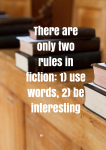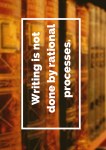25 Take-aways from the Richard Bausch workshop
 I just finished a fourteen-week workshop with internationally-renowned writer of fiction and short stories, Richard Bausch. What I hoped to get was tips on how to improve my writing from a man who knows. After all, he’s published eleven books, an untold number of stories, is the editor of the prestigious Norton Anthology of Short Fiction, and received a bunch of awards including 2013 Winner of the REA award for Short Fiction.
I just finished a fourteen-week workshop with internationally-renowned writer of fiction and short stories, Richard Bausch. What I hoped to get was tips on how to improve my writing from a man who knows. After all, he’s published eleven books, an untold number of stories, is the editor of the prestigious Norton Anthology of Short Fiction, and received a bunch of awards including 2013 Winner of the REA award for Short Fiction.
He teaches at Chapman University in Orange California, but this workshop is only available to non-students, his effort to give-back to the writing community that has been his life. It’s offered once a year, through Chapman College. Hundreds of aspiring authors submit twenty pages representative of their writing and cross their fingers, hoping–praying–they’ll be one of the top twelve selected. If they are–as I was–they work with their new favorite classmates for fourteen weeks to understand what exactly makes great writing happen. Shaping conversation is Richard Bausch with ideas, stories, personal examples, readings from some of the world’s great authors, support, always a smile and encouragement. From the first day, he reminded us all that we never had to wonder if we were good enough as writers. We were or he wouldn’t have selected us.
What a difference that makes in attitude, to know I’m writing from a position of strength, not hope.
Now, with the class behind me, I want to share my top 25 take-aways from those weeks. This is wisdom that resonated with me, surprised me, sometimes contradicted other experts but I came to believe under Richard’s gentle but persistent direction:
You are the docent of your own museum. Meaning: Reflect, analyze, consider all angles, but in the end, it is your story to tell.
When sending submittals to agents, make it look as much like a printed book as possible–margins, double space, font, font size, avoid pictures/colors/borders.
A character doesn’t have to be likable, just interesting. If you’ve ever been told that main characters shouldn’t be bad guys, rethink that premise.
What is the loudest noise in the story? What is the fulcrum of the plot, the characters? Around what do all other story elements revolve?
There are only two rules in fiction: 1) use words, 2) be interesting
If you’re writing in the past perfect tense such as you might for a flashback (for example, s/he had eaten there once), use ‘had’ once at the start of a paragraph and then the rest of the paragraph can be in past tense. But, if you think the reader needs to be reminded, do so.
It isn’t an indulgence to write. It’s an obligation. You have talent.
What you write shapes what you write next. Does that sound obvious? It is, but doesn’t always happen.
You don’t have to provide limo service for your characters. They can get there on their own. Meaning: You don’t have to spell everything out. Leave some to the reader’s imagination.
Every story needs surprises.
The last thing you learn how to do as an author is write in your own voice.
Show and tell. Meaning: What we’ve always learned is ‘show not tell’. In excellent writing, do both.
Reading a lot gives you words for your story.
We are not constrained by reality when writing.
The one promise life always keeps is sorrow. Writing a story about that sorrow is a beautiful thing to do (for me, this explains why so many literary fiction stories are sad).
Post exposition is usually a mistake. Meaning: explaining an action pages after it happened is not a good way to unfold the story.
Two ways to get information out (besides flashbacks and backstory): 1) have the character write a letter with the critical information, 2) reveal it through clothing, setting.
It’s not so much that a character changes from the start to the end of the story. It’s that the reader changes–his/her perception has changed.
POV can switch in a story as long as there’s appropriate segue.
Fiction is life organized and experience shaped so it adds up to meaning. Writers aren’t really putting life on the page; they’re shaping it.
Excellent writing involves a truth that make the reader feel like they’ve experienced it. They carry it around as though it’s true and as though it’s their own truth.
Fiction is writing stories that matter, that are worth an adult’s time.
If you’re afraid the story you’re writing might be a novel, it probably is.
If a story isn’t quite working, it might be in the wrong person–say, first instead of third.
Writing is not done by rational processes.
–photo credit: RichardBausch.com
I left a better writer by far than when I started. And I’m not the only one who felt that way. Check out this review by an attendee at another Richard Bausch workshop and this one by Peggy Burch over at The Shelf Life (she does a great job capturing the atmosphere of the class). If you’re interested in his next season, keep an eye on the Chapman University website. Here’s a link to the 2nd Annual Chapman workshop I participated in. Maybe it’ll help redirect you to the next one.
Any feedback from others who have attended?







More on writing help:
Ten Commandments from Richard Bausch
Writer’s Tips #64: From Kurt Vonnegut
Jacqui Murray is the author of the popular Building a Midshipman , the story of her daughter’s journey from high school to United States Naval Academy. She is webmaster for six blogs, an Amazon Vine Voice book reviewer, a columnist for Examiner.com and TeachHUB, Editorial Review Board member for Journal for Computing Teachers, monthly contributor to Today’s Author and a freelance journalist on tech ed topics. In her free time, she writes technology training books for how to integrate tech in education. Currently, she’s editing a techno-thriller that should be out to publishers next summer.
Filed under: education, writers resources, writers tips Tagged: writing help





